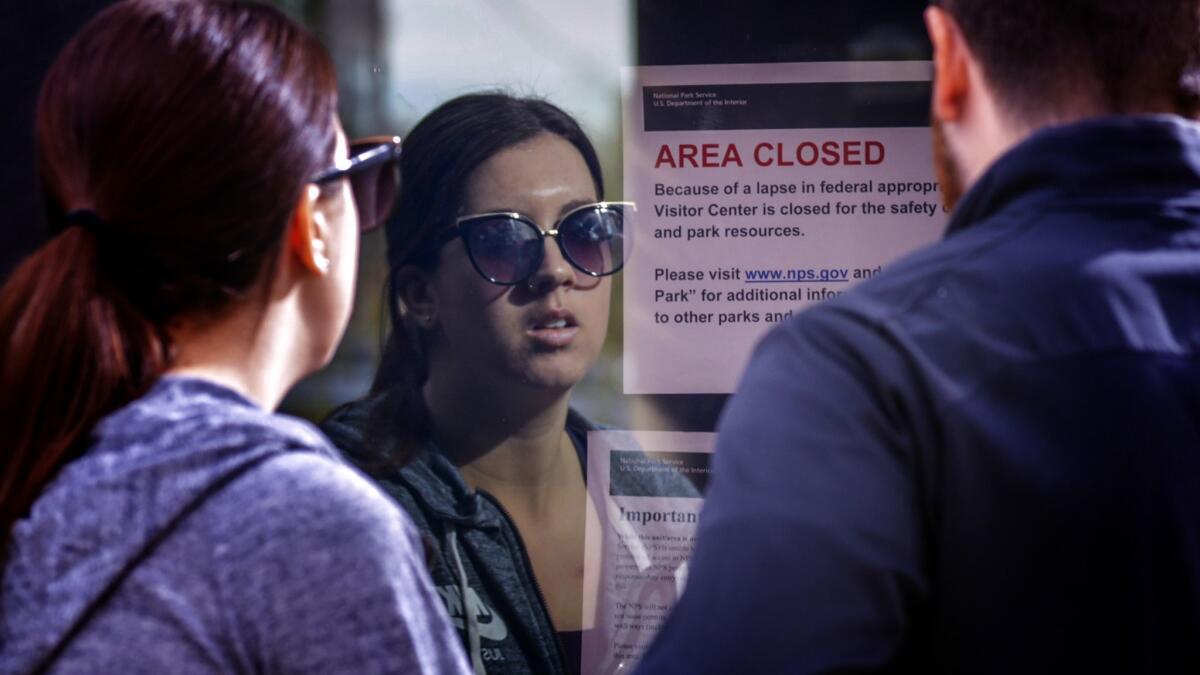Mick Mulvaney signals Trump would accept less money for a wall but expects shutdown to continue

Reporting from Washington — A top White House official signaled Sunday that President Trump is willing to accept less money than he’s been demanding to build a U.S.-Mexico border wall but that the partial government shutdown is likely to stretch into next year.
With Trump continuing to demand money for a wall and Democrats offering spending on other security measures, there was little to inspire hope that a Christmas-season closure of some federal government operations would end later this week, when the House and Senate are scheduled to meet again.
“The president’s not going to not accept money for a border wall,” acting White House Chief of Staff Mick Mulvaney said on ABC’s “This Week.”
He warned that the shutdown could stretch into January, when a new Congress is seated. Mulvaney, who also runs the White House budget office, said he’s awaiting a response from Senate Democratic leader Charles E. Schumer of New York after the administration on Saturday presented Schumer with a counteroffer in the long-running dispute over funding the wall.
Mulvaney withheld specifics but placed the offer at between Trump’s $5.7-billion request and the $1.3 billion Democrats are offering.
“We moved off of the 5 and we hope they move up from their 1.3 [billion],” Mulvaney said on “Fox News Sunday.”
His comment about the president’s softening stance came less than 24 hours after a senior administration official insisted to reporters on Saturday that Congress give into Trump’s demands, highlighting the unpredictable nature of Trump’s negotiating style.
But Democrats held firm on their rejection of wall funding. Sen. Richard J. Durbin (D-Ill.) argued instead for increasing the use of technology along the border instead of building “some medieval wall.”
Asked on NBC’s “Meet the Press” whether he’s willing to increase the price tag as long as the money is not spent on a wall, Durbin responded: “Absolutely.”
A stalemate over the wall led parts of the government to shut down Saturday after funding for numerous departments and agencies expired. The closure, affecting hundreds of thousands of federal workers across the country, was expected to last at least through late this week after the House and Senate, which each met in a rare weekend session, adjourned until Thursday.
Mulvaney predicted the shutdown could extend into January, when Democrats will assume control of the House based on their midterm election gains.
“It’s very possible that this shutdown will go beyond the 28th and into the new Congress,” Mulvaney said.
Justin Goodman, a spokesman for Schumer, countered: “If Director Mulvaney says the Trump Shutdown will last into the New Year, believe him, because it’s their shutdown.”
Trump faced resistance from some Republicans. Retiring Sen. Bob Corker (R-Tenn.), who has criticized Trump on other issues, called the battle for border wall funding a “made-up fight so the president can look like he’s fighting.”
“This is something that is unnecessary. It’s a spectacle. And, candidly, it’s juvenile. The whole thing is juvenile,” Corker said in an interview on “State of the Union” on CNN. He argued for other measures to secure the border.
Trump tweeted Sunday, the shutdown’s second day, that the only way to stop drugs and what he calls “criminal elements” from entering the country is a physical barrier: “Drones and all of the rest are wonderful and lots of fun, but it is only a good old fashioned Wall that works!”
Across the country, the shutdown played out in uneven ways. The Statue of Liberty remained open for tours, thanks to New York state, and the U.S. Postal Service, an independent agency, was still delivering mail.
But the routines of 800,000 federal employees were about to be disrupted. More than half are deemed essential and are expected to work without pay, through retroactive pay is expected. An additional 380,000 were to be furloughed, meaning they will not report to work but would be paid later. Legislation ensuring that workers receive back pay was expected to clear Congress.
Trump was staying in Washington for Christmas because of the shutdown, the White House said.
The president, who campaigned on the promise of building the wall and forcing Mexico to pay for it, had savored the prospect of a shutdown fight. He recently said he’d be “proud” to close down the government and has gone back on his pledge to not blame Democrats for the closure.
Schumer and Vice President Mike Pence met Saturday at the request of the White House, according to Schumer’s office. But the senator’s spokesman said they remained “very far apart” on a spending agreement.
Democrats said they were open to proposals that didn’t include the wall, which Schumer said was too costly and ineffective. They have offered to keep spending at existing levels of $1.3 billion for border fencing and other security.
Senators approved a bipartisan deal last week to keep the government open into February and provide $1.3 billion for border security projects, but not the wall. But as Trump faced criticism from conservatives, he pushed the House to approve a package temporarily financing the government but also setting aside $5.7 billion for the border wall.
The impasse blocked money for nine of 15 Cabinet-level departments and dozens of agencies, including Homeland Security, Transportation, Interior, Agriculture, State and Justice.
Those being furloughed included nearly everyone at NASA and 52,000 workers at the Internal Revenue Service. Many national parks were expected to close.
The Pentagon and the departments of Veterans Affairs and Health and Human Services are among those that Congress has fully funded and will operate as usual. Also still functioning were the FBI, the Border Patrol and the Coast Guard.
Transportation Security Administration officers continue to staff airport checkpoints, and air traffic controllers were on the job.
More to Read
Sign up for Essential California
The most important California stories and recommendations in your inbox every morning.
You may occasionally receive promotional content from the Los Angeles Times.










